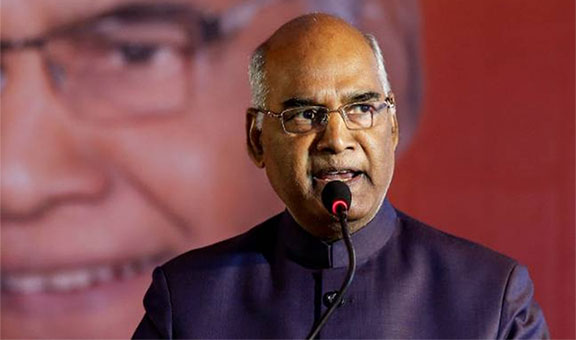President Kovind approves Insolvency and Bankruptcy Code amendment ordinance
President Ram Nath Kovind gave his consent to the ordinance for amendments to be made under the Insolvency and Bankruptcy Code, 2016.

New Delhi: President Ram Nath Kovind gave his consent to the ordinance for amendments to be made under the Insolvency and Bankruptcy Code, 2016 on today.
By virtue of this, amendments can be made to sections 2, 5, 25, 30, 35 and 240 of the Code, and insert new sections 29A and 235A in the Code. The Ordinance aims at putting in place safeguards to prevent unscrupulous, undesirable persons from misusing or vitiating the provisions of the Code.
Also Read: PM Modi meets Sri Lankan PM Wickremesinghe
Mentioned amendments aim to keep out such persons who have willfully defaulted, are associated with non-performing assets, or are habitually non-compliant and, therefore, are likely to be a risk to successful resolution of insolvency of a company.
Also Read | President Kovind's school hosts lunch to celebrate his success
In addition to putting in place restrictions for such persons to participate in the resolution or liquidation process, the amendment also provides such check by specifying that the Committee of Creditors ensure the viability and feasibility of the resolution plan before approving it. The Insolvency and Bankruptcy Board of India (IBBI) has also been given additional powers
The regulations by the IBBI were also amended recently to ensure that information on the antecedent of the applicant submitting the resolution plan along with information on the preferential, undervalued or fraudulent transactions are placed before the Committee of Creditors in order for it to take an informed decision on the matter.
Along with other steps towards improving compliances, actions against defaulting companies to prevent misuse of corporate structures for diversion of funds, reforms in the banking sector, weeding out of unscrupulous elements from the resolution process is part of ongoing reforms of the Government. These would help strengthen the formal economy and encourage honest businesses and budding entrepreneurs to work in a trustworthy, predictable regulatory environment.
Also Read: PM Modi urges action against cyber space as 'playground for terrorism, radicalisation'
Also Read |
President Kovind to give away National Safety Awards (Mines) on Thursday
With the consent in place, the following changes will be incorporated: In order to ensure that the provisions of the Code and the rules and regulations prescribed there under are enforced effectively, the new section 235A provides for punishment for contravention of the provisions where no specific penalty or punishment is provided.
The punishment is fine which shall not be less than one lakh rupees but which may extend to two crore rupees. Consequential amendments in section 240 of the Code, which provides for power to make regulations by IBBI, have been made for regulating making powers under section 25(2)(h) and 30(4). (ANI)
 Dynamite News
Dynamite News 